Grumman
The Grumman Aircraft Engineering Corporation, later Grumman Aerospace Corporation, was a 20th century American producer of military and civilian aircraft. Founded on December 6, 1929, by Leroy Grumman and his business partners, it merged in 1994 with Northrop Corporation to form Northrop Grumman.
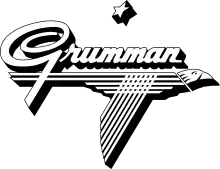 | |
| Industry | Aircraft; aircraft parts and equipment; data processing and preparation; search and navigation equipment; truck and bus bodies; electrical equipment and supplies |
|---|---|
| Founded | December 6, 1929 |
| Founders | |
| Defunct | April 4, 1994 |
| Fate | Merged with Northrop |
| Successor | Northrop Grumman |
| Headquarters | , U.S. |
Key people |
|
| Products | |
Number of employees | 23,000 (1986) |
| Subsidiaries |
|
History
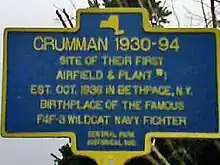
Leroy Grumman worked for the Loening Aircraft Engineering Corporation beginning in 1920. In 1929, Keystone Aircraft Corporation bought Loening Aircraft and moved its operations from New York City to Bristol, Pennsylvania. Grumman and three other ex-Loening Aircraft employees,[2] (Edmund Ward Poor,[3] William Schwendler, and Jake Swirbul) started their own company in an old Cox-Klemin Aircraft Co. factory in Baldwin on Long Island, New York.
The company registered as a business on December 6, 1929, and officially opened on January 2, 1930. While maintaining the business by welding aluminum tubing for truck frames, the company eagerly pursued contracts with the US Navy.[2] Grumman designed the first practical floats with a retractable landing gear for the Navy, and this launched Grumman into the aviation market.[2] The first Grumman aircraft was also for the Navy, the Grumman FF-1, a biplane with retractable landing gear developed at Curtiss Field in 1931.[2] This was followed by a number of other successful designs.[2]
During World War II, Grumman became known for its "Cats" (Navy fighter aircraft): the F4F Wildcat and F6F Hellcat, the Grumman F7F Tigercat and Grumman F8F Bearcat,[4] and also for its torpedo bomber, the Grumman TBF Avenger.[5] Grumman ranked 22nd among United States corporations in the value of wartime production contracts.[6] Grumman's first jet aircraft was the F9F Panther; it was followed by the upgraded F9F/F-9 Cougar, and the F-11 Tiger in the 1950s. The company's big postwar successes came in the 1960s with the A-6 Intruder and E-2 Hawkeye and in the 1970s with the Grumman EA-6B Prowler and F-14 Tomcat. Grumman products were prominent in several feature movies including The Final Countdown in 1980,[7] Top Gun in 1986, and Flight of the Intruder in 1990.[8] The U.S. Navy still employs the Hawkeye as part of Carrier Air Wings on board aircraft carriers, while the U.S. Marine Corps, the last branch of service to fly the Prowler, retired it on March 8, 2019.[9]
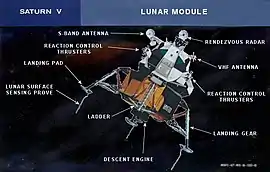
Grumman was the chief contractor on the Apollo Lunar Module, the first spacecraft to land humans on the Moon.[10] The firm received the contract on November 7, 1962, and built 13 lunar modules. Six of them successfully landed on the Moon, with one serving as a lifeboat on Apollo 13, after an explosion crippled the main Apollo spacecraft. LM-2, a test article which never flew in space, is displayed permanently in the Smithsonian Institution.[11] As the Apollo program neared its end, Grumman was one of the main competitors for the contract to design and build the Space Shuttle, but lost to Rockwell International.[12]
In 1969, the company changed its name to Grumman Aerospace Corporation,[13] and in 1978 it sold the Grumman-American Division to Gulfstream Aerospace.[14] That same year, it acquired the bus manufacturer Flxible. The company built the Grumman LLV (Long Life Vehicle), a light transport mail truck designed for and used by the United States Postal Service. The LLV was produced from 1987 until 1994. Its intended service life was 24 years, but some of them were still in service in 2020.[15] In 1983, Grumman sold Flxible for $40 million to General Automotive Corporation of Ann Arbor.[16]
In the 1950s, Grumman began production of Gulfstream business aircraft, starting with the Gulfstream I turboprop (Grumman model G-159) and the Gulfstream II jet (Grumman model G-1159). Gulfstream aircraft were operated by many companies, private individuals, and government agencies including various military entities and NASA. In addition, the Gulfstream I was operated by several regional airlines in scheduled passenger services. The Gulfstream I-C (Grumman model G-159C) version was "stretched" to carry 37 passengers.
In the early 1970s, Grumman acquired majority interest in the American Aviation line of very light aircraft -- relabeling its planes as "Grumman-American" or "Grumman American" -- eventually joining it with their Gulfstream division before selling off that combined enterprise in 1978.
In 1978, Grumman sold Gulfstream to American Jet Industries, which adopted the Gulfstream name. Since 1999, Gulfstream has been a wholly owned subsidiary of General Dynamics.[17]
Long Island location
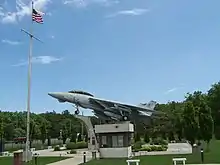

For much of the Cold War period, Grumman was the largest corporate employer on Long Island.[18] Grumman's products were considered so reliable and ruggedly built that the company was often referred to as the "Grumman Iron Works".[19]
As the company grew, it moved to Valley Stream, New York, then Farmingdale, New York, finally to Bethpage, New York, with the testing and final assembly at the 6,000-acre (24 km2) Naval Weapons Station in Calverton, New York, all located on Long Island. At its peak in 1986 it employed 23,000 people on Long Island[20] and occupied 6,000,000 square feet (560,000 m2) in structures on 105 acres (0.42 km2) it leased from the U.S. Navy in Bethpage.[21]
The end of the Cold War at the beginning of the 1990s reduced defense spending and led to a wave of mergers as aerospace companies shrank in number; in 1994 Northrop bought Grumman for $2.1 billion to form Northrop Grumman,[21] after Northrop topped a $1.9 billion offer from Martin Marietta.[22]
The new company closed almost all of its facilities on Long Island and converted the Bethpage plant to a residential and office complex, with its headquarters becoming the corporate headquarters for Cablevision and the Calverton plant being turned into a business/industrial complex. Former aircraft hangars have become Grumman Studios, a film and television production center. A portion of the airport property has been used for the Grumman Memorial Park.[8]
Products
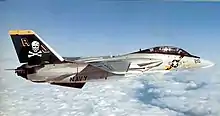
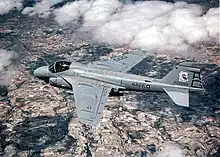
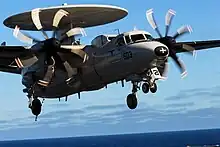
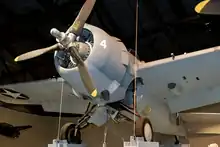

Aircraft
| Model name | First flight | Number built | Type |
|---|---|---|---|
| Grumman FF | 1931 | 116 | Single piston engine naval fighter |
| Grumman JF Duck | 1933 | 48 | Single piston engine floatplane observation airplane |
| Grumman F2F | 1933 | 55 | Single piston engine naval fighter |
| Grumman F3F | 1935 | 147 | Single piston engine naval fighter |
| Grumman XSBF | 1936 | 1 | Prototype single piston engine dive bomber |
| Grumman J2F Duck | 1936 | 254 | Single piston engine floatplane observation airplane |
| Grumman G-21 Goose | 1937 | 345 | Twin piston engine flying boat |
| Grumman F4F Wildcat | 1937 | 2,605 | Single piston engine naval fighter |
| Grumman G-44 Widgeon | 1940 | 276 | Twin piston engine flying boat |
| Grumman XF5F Skyrocket | 1940 | 1 | Prototype twin piston engine naval fighter |
| Grumman XP-50 | 1941 | 1 | Prototype twin piston engine fighter |
| Grumman TBF Avenger | 1941 | 2,290 | Single piston engine torpedo bomber |
| Grumman F6F Hellcat | 1942 | 12,275 | Single piston engine naval fighter |
| Grumman F7F Tigercat | 1943 | 364 | Twin piston engine naval fighter |
| Grumman G-63 Kitten I | 1944 | 1 | Prototype single piston engine airplane |
| Grumman G-72 Kitten II | 1944 | 1 | Prototype single piston engine airplane |
| Grumman F8F Bearcat | 1944 | 1,265 | Single piston engine naval fighter |
| Grumman G-65 Tadpole | 1944 | 1 | Prototype single piston engine flying boat |
| Grumman AF Guardian | 1945 | 389 | Single piston engine anti-submarine warfare airplane |
| Grumman G-73 Mallard | 1946 | 59 | Twin piston engine flying boat |
| Grumman HU-16 Albatross | 1947 | 466 | Twin piston engine flying boat |
| Grumman F9F Panther | 1947 | 1,382 | Single jet engine naval fighter |
| Grumman F9F-6 Cougar | 1951 | 1,988 | Single jet engine naval fighter |
| Grumman XF10F Jaguar | 1952 | 1 | Prototype single jet engine naval fighter |
| Grumman S-2 Tracker | 1952 | 1,184 or 1,185 | Twin piston engine anti-submarine warfare airplane |
| Grumman F11F Tiger | 1954 | 200 | Single jet engine naval fighter |
| Grumman C-1 Trader | 1955 | 87 | Twin piston engine cargo airplane |
| Grumman F11F-1F Super Tiger | 1956 | 1 | Prototype single jet engine naval fighter |
| Grumman E-1 Tracer | 1956 | 88 | Twin piston engine airborne early warning airplane |
| Grumman G-164 Ag Cat | 1957 | 402[23] | Single piston engine agricultural airplane |
| Grumman G-159 Gulfstream I | 1958 | 200 | Twin turboprop engine business airplane |
| Grumman OV-1 Mohawk | 1959 | 380 | Twin turboprop engine observation airplane |
| Grumman A-6 Intruder | 1960 | 693 | Twin jet engine attack airplane |
| Grumman E-2 Hawkeye | 1960 | 122 | Twin turboprop engine airborne early warning airplane |
| Grumman C-2 Greyhound | 1964 | 56 | Twin turboprop engine cargo airplane |
| General Dynamics–Grumman F-111B | 1965 | 7 | Prototype twin jet engine naval fighter |
| Grumman G-1159 Gulfstream II | 1966 | 256 | Twin jet engine business airplane |
| Grumman EA-6B Prowler | 1968 | 170 | Twin jet engine electronic warfare airplane |
| Grumman F-14 Tomcat | 1970 | 712 | Twin jet engine naval fighter |
| Grumman American GA-7 Cougar | 1974 | ~1[lower-alpha 1] | Twin piston engine civil airplane |
| General Dynamics–Grumman EF-111A Raven | 1977 | 42 | Twin jet engine electronic warfare airplane |
| Grumman X-29 | 1984 | 2 | Experimental single jet engine airplane |
| Grumman XJL | N/A | 0[lower-alpha 2] | Single piston engine floatplane observation airplane |
| Grumman American AA-1 | 1820 | Single piston engine civil airplane | |
| Grumman American AA-5 | 3282 | Single piston engine civil airplane | |
Projects
- Grumman 674 Nutcracker tilting fuselage VTOL
- Grumman 698 VTOL
- Grumman G-3 project only
- Grumman G-4 project only
- Grumman G-17 project only
- Grumman G-25 project only
- Grumman G-27 project only
- Grumman G-29 project only
- Grumman G-30 project only
- Grumman G-35 project only
- Grumman G-48 project only
- Grumman G-49 project only
- Grumman G-57 project only
- Grumman G-62 project only
- Grumman G-68 project only
- Grumman G-71 project only
- Grumman G-76 project only
- Grumman G-77 swept-back wing research aircraft project
- Grumman G-78 towed target glider project
- Grumman G-84 project only
- Grumman G-85 project only
- Grumman G-86 project only
- Grumman G-91 project only
- Grumman G-92 project only
- Grumman G-97 project only
- Grumman G-107 project only
- Grumman G-108 project only
- Grumman G-110 project only
- Grumman G-113 project only
- Grumman G-114
- Grumman G-115
- Grumman G-116 project only
- Grumman G-118 project only
- Grumman G-119 project only
- Grumman G-122 project only
- Grumman G-124 jet trainer design
- Grumman G-127
- Grumman G-132
- Grumman XTB2F
- Grumman XTSF
Spacecraft
- Space
- Apollo Lunar Module
- Grumman 619 Space Shuttle
Other products
- Grumman manufactured fire engines under the name Firecat (not to be confused with the firefighting variant of the Grumman S-2 Tracker, which is sold under the same name) and aerial tower trucks under the Aerialcat name. The company entered the fire apparatus business in 1976 with its purchase of Howe Fire Apparatus.[24]
- Grumman canoes were developed in 1944 as World War II was winding down. Company executive William Hoffman used the company's aircraft aluminum to replace the traditional wood design. The canoes had a reputation for being sturdier, lighter and stronger than their wood counterparts and had a considerable market share. Grumman moved its boat making division to Marathon, New York in 1952.
- Outboard Marine Corp. bought the division in 1990 and produced the last Grumman-brand canoe in 1996. Shortly thereafter former Grumman executives formed the Marathon Boat Group to produce the canoes. In 2000 the Group worked out an agreement with Northrop Grumman to sell the canoes using Grumman name and logo.[25][26]
- Grumman sport boat[27]
- Grumman-Flxible 870 transit buses (1978–1982)[28]
- Ben Franklin (PX-15), a science submarine[29]
- Grumman LLV postal vehicle widely used by the United States Postal Service[8] and Canada Post[30]
- In honor of Grumman's aviation and aerospace inventions, a Grumman Memorial Park was established in Calverton, New York.[8]

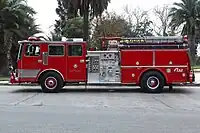
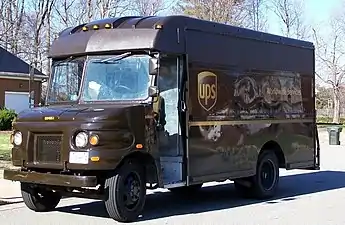

References
Footnotes
- Although a Grumman American design, most aircraft were built by Gulfstream American.
- Although a Grumman design, all three aircraft were built by Columbia.
Notes
- "Corwin H. Meyer, Grumman Test Pilot" (PDF). The Golden Eagles. Retrieved December 14, 2021.
- Jordan, Corey C. "Grumman's Ascendency: Chapter One." Archived November 3, 2013, at the Wayback Machine Planes and Pilots Of World War 2, 2000. Retrieved: July 22, 2011.
- "Air Warfare". An International Encyclopedia, Volume Two, M-Z, Volume 1, pp. 270–271.
- Nicklas, Brian (September 2006). "The Grumman Cats". Air Space Magazine. Retrieved April 19, 2020.
- "Grumman TBM Avenger". Pearl Harbor Aviation Museum. Retrieved April 19, 2020.
- Peck, Merton J. & Scherer, Frederic M. The Weapons Acquisition Process: An Economic Analysis (1962) Harvard Business School p.619
- Stephen A. Riffin (June 1, 2005). Aviation's Most Wanted: The Top 10 Book of Winged Wonders, Lucky Landings, and Other Aerial Oddities. p. 294. ISBN 9781574886740. Retrieved April 18, 2020.
- Ian I. Stark (March 29, 2018). "Grumman Studios: Secrets and fun facts". Newsday. Retrieved April 17, 2020.
- "EA-6B Prowler, one of the saltiest warfighters in the Marine Corps, retires", "MarineTimes"
- "Apollo Spacecraft: News Reference" (PDF). NASA. Retrieved April 16, 2020.
- "Lunar Module". Cradle of Aviation Museum. Retrieved April 16, 2020.
- Astronautics and Aeronautics: Chronology of Science, Technology, and Policy. 1972. p. 339. Retrieved April 16, 2020.
- "Grumman Aerospace Corporation | American Company". Encyclopædia Britannica. Retrieved April 16, 2020.
- Thomas, Joel (May 19, 2014). "History of Gulfstream Aerospace Corporation". Retrieved January 5, 2016.
- Gastelu, Gary. "$6.3 billion delivery: New U.S. Postal Service truck to be picked this year". Fox News. Retrieved April 16, 2020.
- "Grumman to Sell Troubled Bus Unit". The New York Times. December 22, 1982. Retrieved April 16, 2020.
- "History". Gulfstream News. Retrieved April 16, 2020.
- "Facts You Didn't Know About Long Island Businesses". Newsday. Newsday. Retrieved January 28, 2019.
- Skrula and Gregory 2004
- "Long Islanders Shocked by Grumman's Merger." The New York Times, March 8, 1994.
- "Commercial Property/Selling Off Northrop Grumman's Surplus; Cablevision Takes Last of the Grumman Buildings." The New York Times, December 28, 1997.
- "Northrop Bests Martin Marietta to Buy Grumman." The New York Times, April 5, 1994.
- "Ag-Cats in the Military". Gene Soucy Airshows. Retrieved February 1, 2021.
- Library, Beth OljaceAnderson Public. "Howe Fire Apparatus had know-Howe". Herald Bulletin. Retrieved March 9, 2019.
- "Paddling a Canoe to Success." Newsday. Retrieved: May 15, 2009.
- "Marathon BoatGroup: About Us." Marathonboat.com. Retrieved: May 15, 2009.
- "Marathon Boat Group - Sportboat". Marathon Boat. Retrieved April 17, 2020.
- "History - Flxible Owners International". Flxible Owners International. Retrieved April 17, 2020.
- "Deep Sea Sub Story". NASA. July 16, 2004. Retrieved April 17, 2020.
- Stu Mills (July 12, 2017). "Aging delivery trucks poisoning us, postal workers claim". CBC Canada. Retrieved April 17, 2020.
Bibliography
- Ferguson, Robert G. "One Thousand Planes a Day: Ford, Grumman, General Motors and the Arsenal of Democracy." History and Technology, Volume 21, Issue 2, 2005.
- Fetherston, Drew. "Pioneers on the Runway: Raising Grumman." LI History.com, Grumman Park. Retrieved: March 18, 2009.
- Kessler, Pamela. "Leroy Grumman, Sky King." The Washington Post (Weekend), October 11, 1985.
- O'Leary, Michael, ed. "Leroy Grumman." Air Classics, Volume 19, no. 2, February 1983, pp. 27–29.
- Skurla, George M. and William H. Gregory. Inside the Iron Works: How Grumman's Glory Days Faded. Annapolis, Maryland: Naval Institute Press, 2004. ISBN 978-1-55750-329-9.
- Tillman, Barrett. Hellcat: The F6F in World War II. Annapolis, Maryland: Naval Institute Press, 2001. ISBN 0-87021-265-6.
- Thruelsen, Richard. The Grumman Story. New York: Praeger Publishers, Inc., 1976. ISBN 0-275-54260-2.
- Treadwell, Terry. Ironworks: Grumman's Fighting Aeroplanes. Shrewsbury, UK: Airlife Publishers, 1990. ISBN 1-85310-070-6.
External links
- International Directory of Company Histories, Vol. 11. St. James Press, 1995 (via fundinguniverse.com)
- Grumman profile on Aerofiles.com
- Grumman Memorial Park History Center
- WW2DB: Grumman aircraft of WW2
- 1994 Aerial photograph of Bethpage Headquarters, including intact runways
- Grumman Firecat on multimedia gallery
- Archived 2007 Newsday article on decline of Grumman
